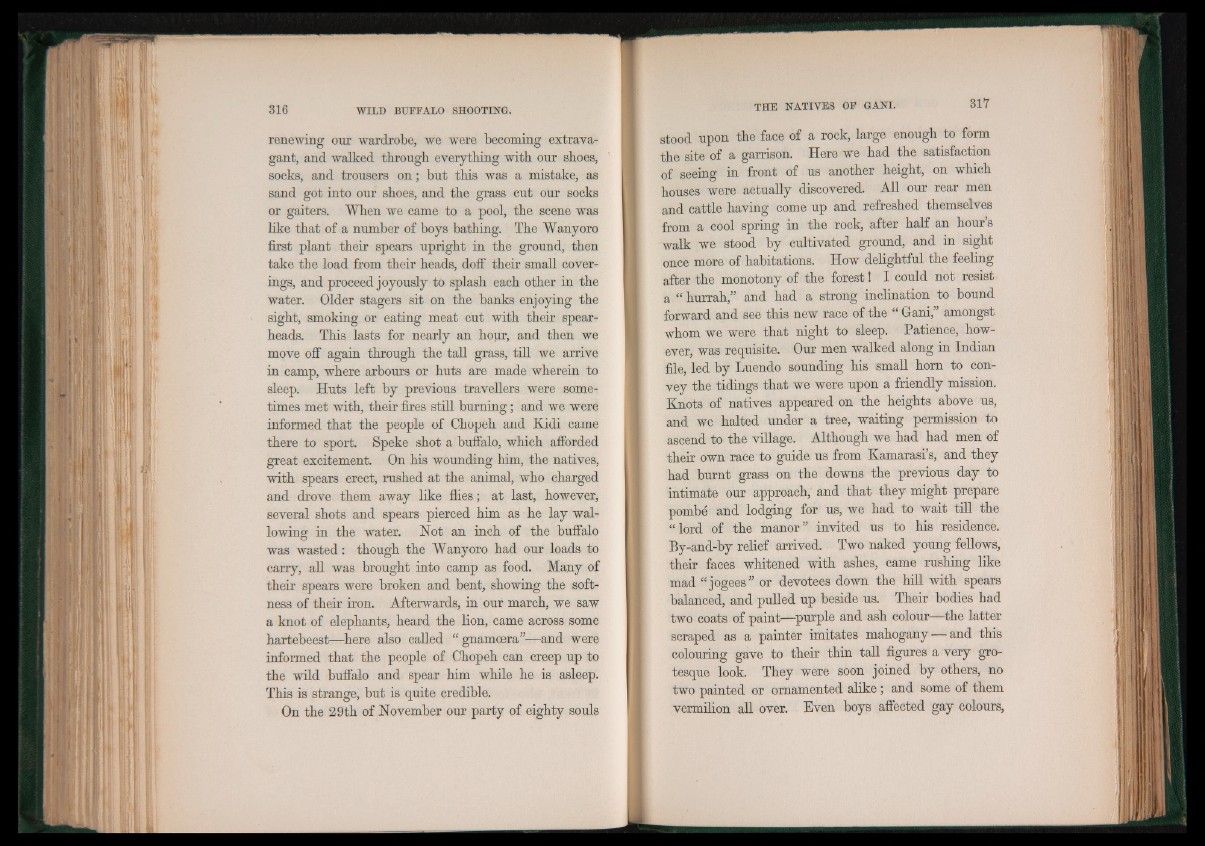
renewing our wardrobe, we were becoming extravagant,
and walked tbrougb everything with our shoes,
socks, and trousers o n ; but this was a mistake, as
sand got into our shoes, and the grass cut our socks
or gaiters. When we came to a pool, the scene was
like that of a number of boys bathing. The Wanyoro
first plant their spears upright in the ground, then
take the load from their heads, doff their small coverings,
and proceed joyously to splash each other in the
water. Older stagers sit on the banks enjoying the
sight, smoking or eating meat cut with their spearheads.
This lasts for nearly an hour, and then we
move off again through the tall grass, till we arrive
in camp, where arbours or huts are made wherein to
sleep. Huts left by previous travellers were sometimes
met with, their fires still burning; and we were
informed that the people of Chopeh and Kidi came
there to sport. Speke shot a buffalo, which afforded
great excitement. On his wounding him, the natives,
with spears erect, rushed at the animal, who charged
and drove them away like flies; at last, however,
several shots and spears pierced him as he lay wallowing
in the water. Not an inch of the buffalo
was wasted: though the Wanyoro had our loads to
carry, all was brought into camp as food. Many of
their spears were broken and bent, showing the softness
of their iron. Afterwards, in our march, we saw
a knot of elephants, heard the lion, came across some
hartebeest—here also called “ gnamoera”—and were
informed that the people of Chopeh can creep up to
the wild buffalo and spear him while he is asleep.
This is strange, but is quite credible.
On the 29 th of November our party of eighty souls
stood upon the face of a rock, large enough to form
the site of a garrison. Here we had the satisfaction
of seeing in front of us another height, on which
houses were actually discovered. All our rear men
and cattle having come up and refreshed themselves
from a cool spring in the rock, after half an hour’s
walk we stood by cultivated ground, and in sight
once more of habitations. How delightful the feeling
after the monotony of the forest! I could not resist
a “ hurrah,” and had a strong inclination to bound
forward and see this new race of the “ Gani,” amongst
whom we were that night to sleep. Patience, however,
was requisite. Our men walked along in Indian
file, led by Luendo sounding his small horn to convey
the tidings that we were upon a friendly mission.
Knots of natives appeared on the heights above us,
and we halted under a tree, waiting permission to
ascend to the village. Although we had had men of
their own race to guide us from Kamarasi’s, and they
had burnt grass on the downs the previous day to
intimate our approach, and that they might prepare
pombd and lodging for us, we had to wait till the
“ lord of the manor” invited us to his residence.
By-and-by relief arrived. Two naked young fellows,
their faces whitened with ashes, came rushing like
mad “jogees” or devotees down the hill with spears
balanced, and pulled up beside us. Their bodies had
two coats of paint—purple and ash colour—the latter
scraped as a painter imitates mahogany — and this
colouring gave to their thin tall figures a very grotesque
look. They were soon joined by others, no
two painted or ornamented alike; and some of them
vermilion all over. Even boys affected gay colours,